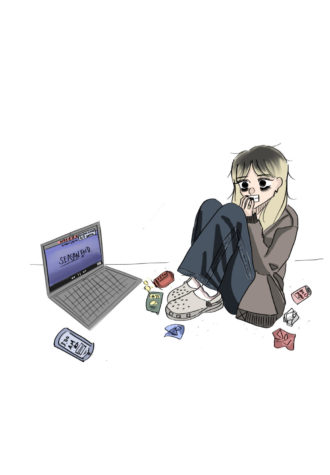Streaming services are ruining serialized TV shows
April 6, 2023

When I find myself deep into a Netflix doom-scroll after finishing a show (which I watched for hours without interruption), I am struck with lament; I am just as bored as I was before.
Entertainment, in general, has been in a precarious position as shows seem to die off as soon as they’re born, and Netflix is promoting hellish new ways to spend entire days sorting through their infinite array of sensationalized T.V. shows with 60-minute episode lengths to farm viewer hours from a single sitting. But unfortunately, shows like Ginny and Georgia or Riverdale, which garner millions of views for their notoriously bad writing, keep getting renewed to keep the lights on at Netflix.
But even as I acknowledge this strange market of quantity over quality, I must also acknowledge that as a human, I lack self-control. Of course I’m going to queue up the next installment of the mediocre original series I’m watching because now, more than ever, I need something new to revive my brain as I’m sedated into a perpetual state of boredom.
In an era of overstimulation, the need for constant consumption is not new or novel by any means—it has become painfully easy to hole up in a room with nothing but the TikTok or Netflix app and be overloaded with all sorts of mind-numbing entertainment for an ungodly amount of time. I would know.
But it also hurts to see how quickly a new show or movie can be abandoned before it has exhausted its fuel, which is an aspect of—dare I mention—Cable T.V. that I miss. In a recent example, when the long awaited season three of Outer Banks finally dropped in late February after 20 months of anticipation from viewers since the last season, the show barely maintained relevance on social media for two weeks. Even though it stayed in or around Netflix’s Top 10 T.V. list for around three weeks, which is longer than the one to two week average peak viewership of shows, it’s still a very short lifespan for a serialized series.
Most viewers, like myself, sat and binged the 10-hour season over the course of a party-sized bag of chips and a weekend, spoke to a few friends about it, joked about some decidedly corny dialogue, and quickly went on to the next topic of interest.
Honestly, I’ve forgotten most of what happened in the season since I watched the episodes back-to-back-to-back until my eyes hurt. Had the show been scheduled for a week-by-week release, like how HBO Max rolls out episodes of Euphoria, how long could this show have kept its longevity? With each episode left on a cliffhanger, how much traction would the show gain with fans theorizing the possible twists, the who-done-what’s, the what-ifs?
This loss of community discussions and engagement, which were common in the previous era of entertainment (Friends, The Office, That ’70s Show), has arguably done damage to the rate of show renewals as well. As big, subscription-based streaming services continue to create and discard stories, it becomes hard to ignore the vast quantity of unfinished dramas left on cliffhangers, canceled shows that were halfway through a story arc, and fearful showrunners rushing storylines in case of a cancellation.
Here is what irks me: not just the (slightly concerning) “binge-model” streaming services seem to have such an affinity for, but also the constant pump of original series, waiting to be the next Stranger Things that will skyrocket the monthly viewership numbers.
On Netflix alone, we’ve seen the same scene play out far too many times when it comes to the termination of a new series. I Am Not Okay With This, The Society, Everything Sucks!, First Kill, and The Get Down, are just a few of the many shows with strong fan bases that were cursed with cancellations after just one, unresolved season.
It seems the dwindling trust in growth potential has led to stories cut short before they can even develop into their prime. Hit shows that struggled severely in their first season like Parks and Recreation or The Walking Dead, never would’ve been met with such success had they been tragically canceled after just one season. Catalogs of series and films are becoming graveyards of shows gone too soon.
Sure, the Netflix binge model has proved to be able to glue viewers to their seats, insisting that “Next episode” will satiate the need for entertainment, but how long will this perpetual state of hunger fuel our consumption?


